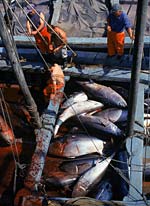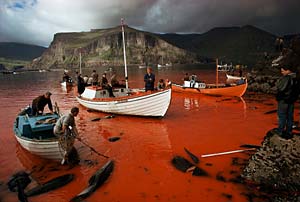   | |
|
Welcome to Mission 2011 Final Presentation Live webcast of the Final Presentation is
on:
Tuesday, Dec. 4th
Note that the webcast will start promptly at 7pm and the doors
will be closed. 6:45 PM in MIT 32-123. Please choose the speed of the connection below. The final presentation will remain on the web after the initial broadcast. The website developed by the students in Mission 2011 with the work that embodies the whole semester is: http://web.mit.edu/12.000/www/m2011/finalwebsite/
About Mission 2011:
Note: The Mission 2011 site for students is located here.  Solving Complex
Problems (12.000) is designed to provide students the opportunity to work as
part of a team to propose solutions to a complex problem that requires an interdisciplinary
approach. For the students of the class of 2011, 12.000 or Mission 2011, will
revolve around the issues associated with the long-term future of our marine
ecosystems and fisheries. Solving Complex
Problems (12.000) is designed to provide students the opportunity to work as
part of a team to propose solutions to a complex problem that requires an interdisciplinary
approach. For the students of the class of 2011, 12.000 or Mission 2011, will
revolve around the issues associated with the long-term future of our marine
ecosystems and fisheries.Fish provide roughly 40 per cent of the protein consumed by nearly two-thirds of the world's population. Global population growth and improved fishing technology are placing unprecedented pressure on the world’s ocean resources. Global marine fish production increased from 19 million tons in 1950 to about 80 million tons in the mid-1980s where it has remained. Chronic overfishing – combined with introduced species and massive pollution – have upset ecological balance, destroyed habitat, and created large "dead zones". When projections of global warming and climate change are added to the mix, it is clear we are in severe crisis. A global plan to save the oceans and the fisheries is long overdue and essential for the planet. Your task is to develop this plan – the future of the planet hangs in the balance. Mission 2011 is also part of the Terrascope program and the future of the world's fisheries will be a year long theme of Terrascope. By enrolling in 12.000 you become part of the Terrascope program and community, even if you do not continue in the Spring. Spring Field Trip: During spring break in March of 2008 we will take a field trip to Iceland. Iceland's fishery is a major part of their economy and we will observe what steps the Icelandic government is taking to protect the fishing industry as well as plan for a future of increasing temperatures, more melting of the polar ice cap, and global decline in the health of the oceans. In addition, Iceland offers a tremendous opportunity to study geology because the island is an exposed spreading center where new oceanic crust is formed. This gives the Icelandic people an opportunity to generate power directly from the Earth's interior.  About 12.000: About 12.000:"Solving Complex Problems" (12.000) is a nine-unit, Fall-semester subject designed to provide freshmen with the opportunity to work as part of an "imagineering" team to design a viable solution to a complex problem that requires an interdisciplinary approach. It is also known as Mission 2011 - Saving the World's Oceans. Each year's class explores a different problem in detail through the study of complimentary case histories and the development of creative solution strategies. It includes training in web site development, effective written and oral communication, and team building. Receiving major financial support from the Alex and Britt d'Arbeloff Fund for Excellence in MIT Education, 12.000 is designed to enhance the freshman experience by helping students develop contexts for other subjects in the sciences and humanities, and by helping them to establish learning communities that include upperclassmen, faculty, MIT alumni, and professionals in science and engineering fields. Why Mission classes? The Mission class(es) offer freshman a completely different way to learn. In contrast to the core classes that rely on lectures and problem sets, Mission attempts to teach students how to think about solving complex problems. Students in Mission are independent, largely self-directed, and interactive. They learn how to build teams and develop solutions that require teamwork between scientists and engineers. Mission students will learn that many problems are just too big and complex to be solved by any one person or discipline and must involve integration. At the end of the class the students of Mission will have developed new and innovative solutions to an "unsolvable" problem and been exposed to a variety of different disciplines.  History of the Class History of the ClassProfessor Kip Hodges, now at Arizona State University, conceived of the course and supervised it for the first six years. It was offered first in Fall 2000, when the assignment (Mission 2004) was to develop a viable mission plan for the exploration of Mars with the aim of finding evidence for the present or past existence of life. The assignment for Fall 2001 (Mission 2005) was to design undersea research stations for both coral reef and abyssal environments. Fall of 2002 (Mission 2006) charged students with developing a strategy for monitoring and preserving the Amazon Rainforest. As in previous years, the students in Mission 2006 described their final design in a content-rich web site and an oral presentation in front of a panel of international experts. Mission 2007 was focused on Arctic National Wildlife Refuge (ANWR), Mission 2008 - Galapagos, Mission 2009 -Tsunamis and Mission 2010 - Saving N'awlinz. |
|
   |